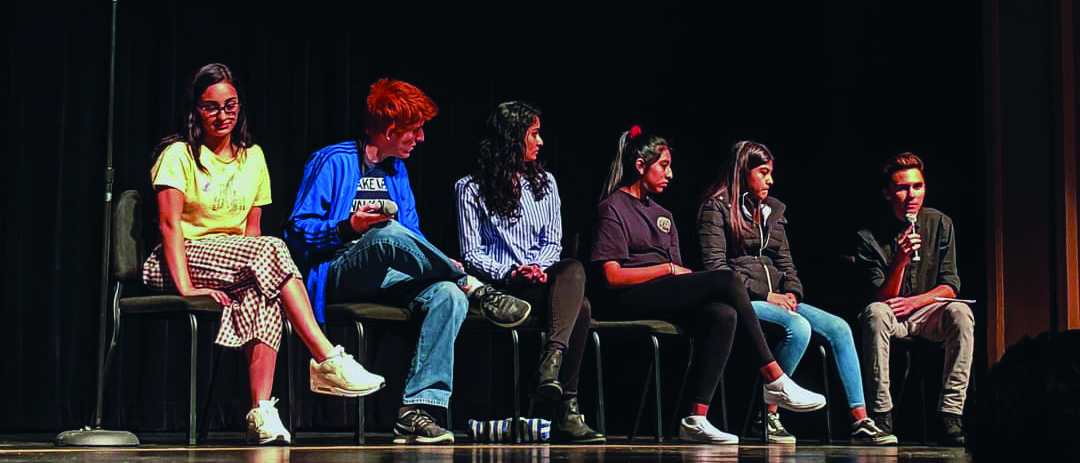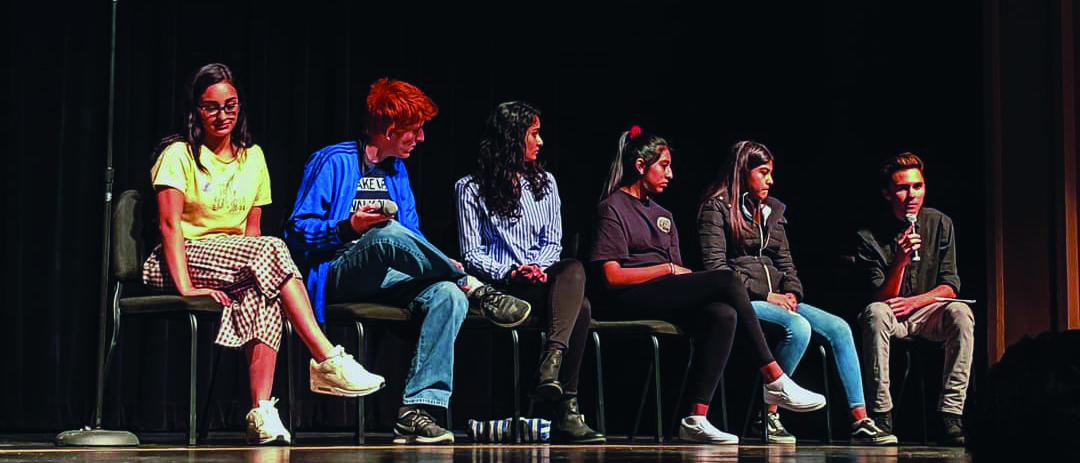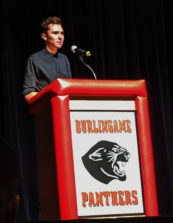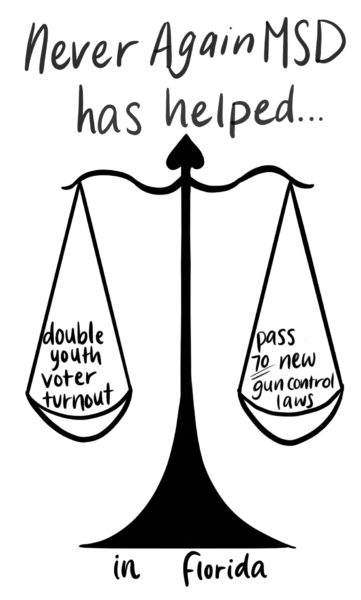
Parkland survivors Ryan Deitsch and David Hogg visited Burlingame High School.

Written by Isabella Krzesniak and Kimberly Woo
Burlingame High School hosted a March for Our Lives presentation on Jan. 26, featuring Marjory Stoneman Douglas (MSD) High School shooting survivors and activists David Hogg and Ryan Deitsch. Hogg and Deitsch spoke about their work in furthering gun violence prevention. Along with guest panelists, they answered questions from an audience of approximately 350 people who reserved seats in advance.
“They talked about the intersectionality of [gun violence] and how it overlaps with police brutality and racial discrimination,” said Aragon junior Leila Tamale. “I also really liked how it was interactive because they invited students to ask them questions.”
Hogg opened with his account of the Feb. 14, 2018 shooting. During seventh period, Hogg and his fellow classmates heard a gunshot, and shortly after, they sheltered in a culinary arts classroom for two hours. During this time, the shooter killed 17 people, one of whom was MSD student Joaquin Oliver.
“Joaquin had gone out the night before with his father to buy flowers for his girlfriend Tori,” Hogg said. “He bought sunflowers, and the period before the shooting he gave her those sunflowers. Little did Tori know, little did Joaquin know, [it] was the last time that Tori was going to be able to say to Joaquin that I love you.”
Hogg and Deitsch are two of the founding members of Never Again MSD, a movement which promotes gun violence prevention. Since its foundation on Feb. 15, 2018, the movement has worked with state legislators to pass over 70 new gun control laws at the state level and helped double youth voter turnout in their home state of Florida.
“This is not a right or left issue — this is an American issue,” Hogg said. “There is something fundamentally wrong with the fact that we live in a developed country that claims to be the safest place, but we can’t even keep our own kids alive within our communities.”
Henry Lie, a senior at Terra Nova High School, emphasized the importance of firsthand experiences of gun violence.
“When you have someone who experiences it firsthand, they have a whole different outlook than someone who’s just seen it on the news,” Lie said. “I feel like, especially with the oversaturation of crises in our media today, it’s especially important that we remember the human aspects of every single issue.”

The guest panelists were Lily Navab, Associated Student Body copresident of Burlingame High School; Uma Krishnan, University of California, Berkeley senior and Burlingame High School alumna; Karla Martinez, a student from Everest High School; and Danna Martinez, a student from Cunha Middle School. One audience member asked the speakers to share their general feelings about gun violence.
“[Gun violence] is something that for far too long has been treated like an act of God,” Deitsch said, “[as if] gun violence is just something that is always supposed to happen in society, like a tornado, hurricane or earthquake that is unstoppable. That what happens just happens and then you move on. But for the people who are actually impacted by gun violence, you can’t just move on.”
Jacqueline Gallardo Cadena, a student at Eastside College Prep, resonated with the idea that gun violence is a normalcy.
“I grew up around it,” Gallardo Cadena said. “[Using guns] was always a means to solve [people’s] issues. It was shocking to hear all these little kids from young ages [are] willing to get a gun. It was frightening for me and my little brothers.”
Audience members were also encouraged to ask questions. One question was about the relationship between mental health and gun violence.
“What [the person] was saying about deconstructing the stigma around mental health and mental illness and specifically correlating it to gun violence was very important,” Krishnan said. “There is malicious intent, and that’s not necessarily correlated to mental health and mental illness.”
Navab emphasized youth advocacy and dialogue.
“Having this conversation and developing this community that’s really open about these difficult topics is one part of it,” Navab said, “but you can’t stop there because that’s not how we enact things in this country.”
Navab, Hogg and Deitsch highlighted intersectionality when addressing gun violence.
“Covering [mass shootings] properly is not just profiling because right now, as we’ve observed and seen, if it’s a white shooter, they’re mentally ill. If it’s a black shooter, they’re criminal. If they’re from Central or South America, they get covered as an illegal immigrant. If they’re from Middle East, they get covered as a terrorist,” Hogg said. “That’s not the case for any individual because every person is different. Every instance is different, and we cannot just be lazy in the way we cover horrific tragedies like gun violence.”
“That’s not the case for any individual because every person is different”
Deitsch addressed the distinction between offering a voice and speaking up.
“We have to make sure that we’re reaching across, that we’re speaking to everybody who’s affected by this issue. David and I can’t speak for the kids in Oakland. We can’t speak for those kids in Chicago,” Deitsch said. “We can’t speak for the teen in Omaha who almost committed suicide. We can’t speak for those people because we don’t live there. All we can do is hope that communities [are] able to speak out about their issues and what we have come to do through this organization is raising their platform along us.”
San Mateo Activist Coalition (SMAC), a local student activist group that Hogg praised, was inspired by the event’s emphasis on intersectionality to promote self-awareness and change.
“When [Deitsch] brought an aspect of self awareness into the conversation, he was talking about how he can’t be the voice of other people that don’t come from the same situation as him. He can’t be the voice of a young black man from Compton because he isn’t one,” SMAC Club Liason Tamale said. “If you’re privileged and come from a fortunate situation, then you should take it upon yourself to try to provide others who aren’t as fortunate with the same platform that you’ve been handed.”
Before the presentation, Hogg and Deitsch attended the San Mateo City of Councils meeting to discuss legislation, but they wanted to converse with the San Mateo community to spread awareness about gun violence prevention.
“The hope is that [the City of Councils] actually did listen to our pleas, that they do form a violence intervention program and they actually put more care into youth leadership in this area,” Deitsch said. “A stipulation [we have] for most trips that we go on is we to have a youth meetup [at some time]. We want to make sure that we meet people who we can actually talk to, and we can move this movement further.”

Burlingame Mayor Donna Colson helped organize the event, along with City Councilwoman Ann Keighran and San Mateo Union High School District Board Trustee Greg Land, who helped the SMUHSD donate the use of the auditorium. A local Burlingame family who supports youth engagement contributed to the event’s organization in order for the tickets to be free for all.
“We’ll have our [student resource] officer to make sure that everyone feels safe,” Colson said. “The most important thing is to make sure we create a safe environment for everybody to listen and participate.”
Tamale addressed ideas on spreading awareness in the local community, especially for gun violence prevention.
“Everybody who went there, even if they come out of that room and talk to one person, that’s still hundreds of people conversing about gun violence prevention, and that’s more minds being open to something they may have not previously considered,” Tamale said.
Due to the success of this event, Colson looks forward to planning more events that promote youth and civic activism.
“[The city council is] getting ready to have a youth voter engagement seminar with myself and one of my council colleagues through our Parks and Recreation Commission in April to sit down, meet and talk to youth and see what matters to them, what’s important to them and how they can get involved locally to make a difference in their community,” Colson said.
Currently, the city council is working on legislation to promote safety from gun violence.
“One would be at the local level, working on gun storage protections and government storage efforts,” Colson said. “The other thing was more information and … enhanced registration for gun users and owners so that they have to provide more details and information about who they are.”
While conversations about injustice are valuable, Hogg believes legislation needs to happen for a safer future.
“Until we get the change that we seek, mass shootings and gun violence [are] going to continue. Until we vote every politician, that sees this as an issue that they can’t talk about out of office, this is going to continue,” Hogg said. “Until every child no longer has to go through a school shooting drill on an annual basis, this movement will never end.”




